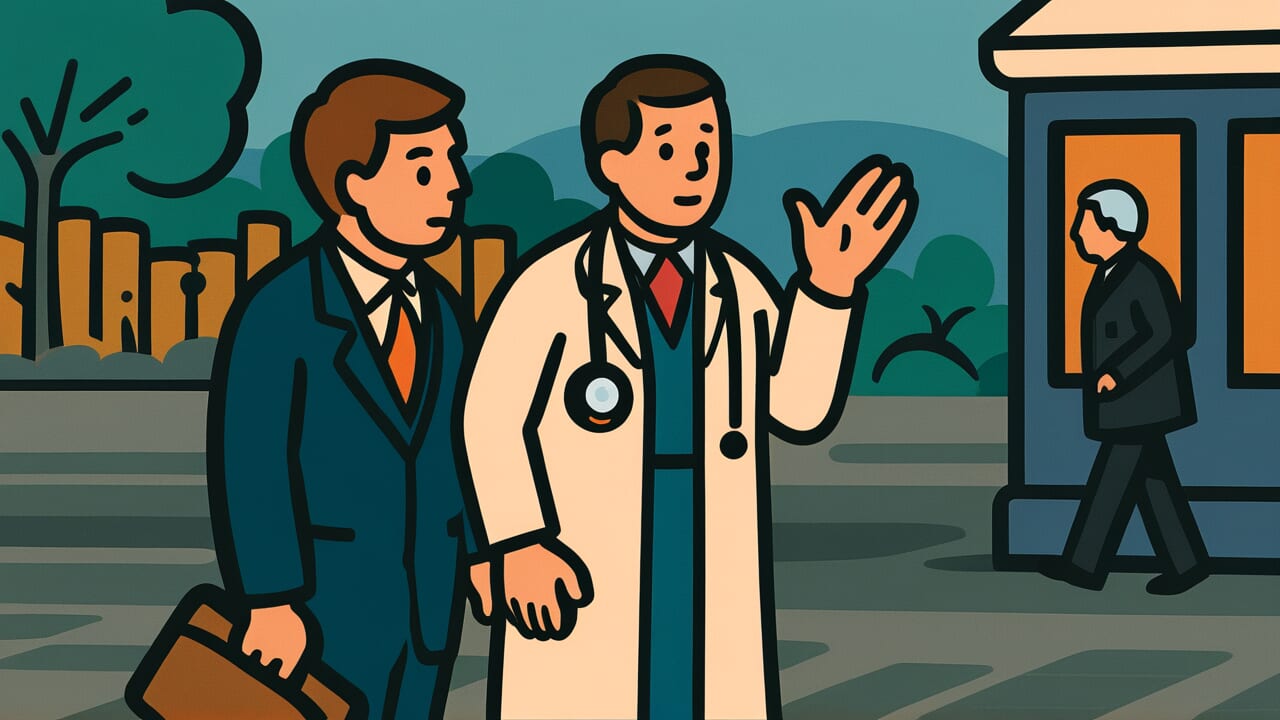How to Read “Doctor talk on the way back from a funeral”
Sōrei gaeri no isha banashi
Meaning of “Doctor talk on the way back from a funeral”
This proverb means that offering plausible theories or analysis after something has already ended is completely useless. Like a doctor discussing the cause of death on the way back from a funeral, no matter how accurate the explanation, it cannot change the situation once the result is already determined.
It’s used to criticize people who stay silent when asked for their opinion beforehand, but then act like critics after a failure saying “I told you so” or “You should have done it this way.” It’s also used for self-reflection when you realize something too late and regret it.
Even today, this expression accurately describes the futility of poorly timed advice or analysis. Examples include people who only analyze causes in meetings after a project fails, or those who discuss the correct answers after an exam is over.
The lesson is that what matters is action beforehand, not reasoning afterward.
Origin and Etymology
The exact first written appearance of this proverb is unclear, but it’s believed to have emerged from the everyday experiences of common people during the Edo period.
Back then, doctors examined and treated sick patients. However, medicine was still developing, and unfortunately doctors couldn’t always save their patients. After a funeral ended, how did people view doctors who said things like “I should have done this” or “That was such-and-such disease”?
The patient had already passed away. No matter how accurate the diagnosis or how appropriate the treatment method, it could no longer reach that person. No matter how much reasoning a doctor offered after returning from a funeral, it was just hindsight that couldn’t change the outcome.
This scene contains a certain human absurdity and sadness. The sharpness of this proverb lies in expressing the meaninglessness of saying “I should have done that” after everything is over, through the figure of a doctor, a supposed expert.
It’s an expression that strikes at the essence of human nature, born from the keen observation of common people.
Usage Examples
- Saying “That design wasn’t good” after the project failed is just doctor talk on the way back from a funeral. You should have said it in the meeting.
- Regretting your answers after looking at the test is doctor talk on the way back from a funeral. All you can do is apply it next time.
Universal Wisdom
Humans have a tendency to want to explain things after they’re over. Why is that? It’s because we have a desire to demonstrate our intelligence through after-the-fact analysis, or to prove “I knew it all along.”
This proverb has been passed down for so long because it sharply points out this fundamental human weakness. Having the courage to act beforehand is difficult.
Speaking up with an opposing opinion might create conflict. Being wrong might be embarrassing. These fears silence us. But once things are over, there’s no need to fear conflict or failure anymore. That’s why people can become critics from a safe position.
Our ancestors saw through this human cunning and cowardice. By using a doctor as an example—a profession that should require the most advance judgment—they highlighted this contradiction.
No matter how expert someone is, if they miss the timing, they’re no different from an amateur. More than knowledge or analytical ability, the courage to act at the right time has value.
This universal truth continues to resonate with people across time.
When AI Hears This
The patient takes the doctor’s mistakes to the grave. This structure creates an “unobservability trap” that makes evaluating experts extremely difficult.
With ordinary products, sellers with poor quality get weeded out. Bad restaurants lose customers, and unreliable electronics get low reviews. But in medicine, when the worst outcome—death—occurs, there’s no one left who can share that information.
In other words, the system is structured so that the most important failure cases don’t flow into the market as information.
Information economics calls this “adverse selection.” In markets where buyers can’t judge quality, unscrupulous sellers are more likely to survive. The “lemon market” of used cars selling mostly defective vehicles is famous, but medicine is even more serious.
Patients lack specialized knowledge, results take time to appear, and the final form of failure falls silent.
Modern medical accident investigations and third-party evaluation systems are precisely responses to this structural flaw. If patients themselves can’t evaluate, experts must monitor each other.
This proverb is evidence that common people empirically recognized the profession where information asymmetry appears in its most extreme form.
Lessons for Today
What this proverb teaches modern people is the importance of timing in speech and action. In meetings, at home, and in friendships, we sometimes swallow our words when we should speak up.
We don’t want to make waves. We’d be embarrassed if we were wrong. These thoughts keep our mouths shut.
But saying “I thought so all along” afterward helps no one. What matters is the courage to speak up when necessary, even if imperfectly, even if you might be wrong.
Sharing your opinion beforehand, even if immature, has far more value than offering perfect analysis afterward.
At the same time, this proverb encourages self-reflection. When something fails, instead of criticizing after the fact with “I told you so,” we should adopt a constructive attitude that applies lessons to the future.
We can’t change the past, but we can change the future. Let’s direct the energy we’d spend on regret toward our next action. Your words have value now, in this moment.



Comments